|
Baseball Short Story
Winning Runs Scored after Final Out
The Babe Ruth Story, Babe Ruth as told to Bob Considine (1948)
Babe Ruth and Bob Meusel were suspended for the first six weeks of the 1922 season for participating in an "illegal" barnstorming tour after the 1921 World Series.
The Yankees met the St. Louis Browns the day my suspension was lifted. I'll never forget that game. It was one in a million, for the Browns actually won it after the last man had been called out.
It was played at the Polo Grounds on a Saturday, and there was such a terrific turnout that the police shut the gates an hour before game time. A lot of fans came out to see Bob and me, but it was our second baseman, Aaron Ward, who provided the main thunder. He hit a home run with a man on base, giving us an early 2 to 0 lead on (Urban) Shocker. Sam Jones was our pitcher. He gave up a run in the eighth, but retired the first two men in the ninth and we seemed to have the game won.
Then two pinch-hitters made good for the players at the bottom of the line-up. That brought up Johnnie Tobin, their fast lead-off man. Johnnie grounded down to Wally Pipp at first, who tossed it over to Sam Jones, covering first base, and Umpire Ollie Chill thumbed Tobin out. We broke for the clubhouse while the fans in the lower stands tumbled out onto the field.
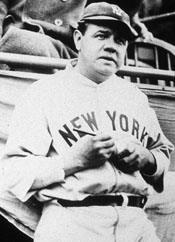 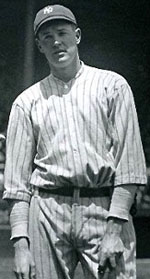 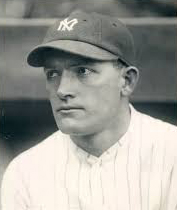 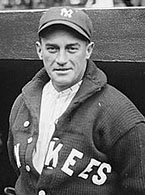 L-R: Babe Ruth, Bob Meusel, Aaron Ward, Urban Shocker
But Jones hadn't made a clean catch of the ball. Pipp's throw hit Sam's glove, took a short bounce, and by the time Sam grabbed it securely Tobin had crossed the bag.
Fohl, coaching a first, squawked ot Chill and finally went to the umpire behind the plate, who admitted that Jones hadn't caught the ball when it first struck his glove and that Tobin should have been ruled safe.
From then on there was the craziest mix-up I ever saw. Some of our players already were in the showers and thought it was a gag when they were told to return to the field. "Hey, I saw Chill call that man out," I squawked, and I had plenty of company.
In the meantime the fans were milling araound on the ball field, and it took the special cops about 20 minutes to clear the field.
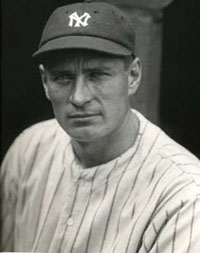 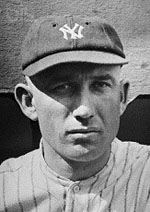 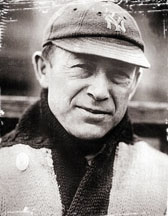 L-R: Wally Pipp, Sam Jones, Miller Huggins, Joe Dugan
It still makes me froth to think what happened after that. Jones had cooled off and had lost his stuff by the time he returned to the rubber. There were a couple of blooper hits and bases on balls which tied the score, and then that big (Baby Doll) Jacobson came up with the bases filled and knocked a ball into the lower rightfield stands.
The Browns scored six runs after their last man had been called out and beat us 6 to 2!
If ever there was a wild ball club it was us in the clubhouse that night. As for Jones, the loss of the game bothered him so that he went on a ten-game losing streak immediately afterward.
I wasn't much help. While my suspension limited my season to 110 games, I fell off in all departments. My batting average sank from .378 to .315, and my home runs dropped from 59 to 35. That still was a lot of homers, but it wasn't good enough to keep my home-run title that season.
Our 1922 team wasn't a harmonious club, and looking back I'm really surprised we finally won. I had my arguments with Hug (Manager Miller Huggins) and so did (P Waite) Hoyt, (P Carl) Mays and P (Bullet Joe) Bush. The club knew that (owner Tillie) Huston had no use for (Manager Miller) Huggins, and that didn't increase our respect for the little man.
The Yankees of that period were an odd club. I don't believe there ever was a gamer, more fighting team. We played up to the hilt in every game, but we had more than our share of night riders. We kept a couple of Jersey beer barons rich.
We never would have that 1922 pennant if it hadn't been for a deal Ruppert was able to work with (Red Sox owner Harry) Frazee late in July. At the time we were trailing the Browns by two games. We were weak at third base, where the great Frank Baker had finally slowed to a walk and Mike McNally was "good field – no hit!"
The Colonel waved that moneybag under Frazee's nose, and the next day we had Joe Dugan, then the best third baseman in baseball. That late-season deal had the St. Louis fans wild, and poor Joe was panned there for years, even though he had no more to do with the transaction that Joe Doakes.
Our winning margin in 1922 was only one game. We won the pennant on the home grounds of the Browns by taking two out of three in a rough September series. The crowd hate us so much I thought they'd come out of the stands after us when we beat their heroes. |